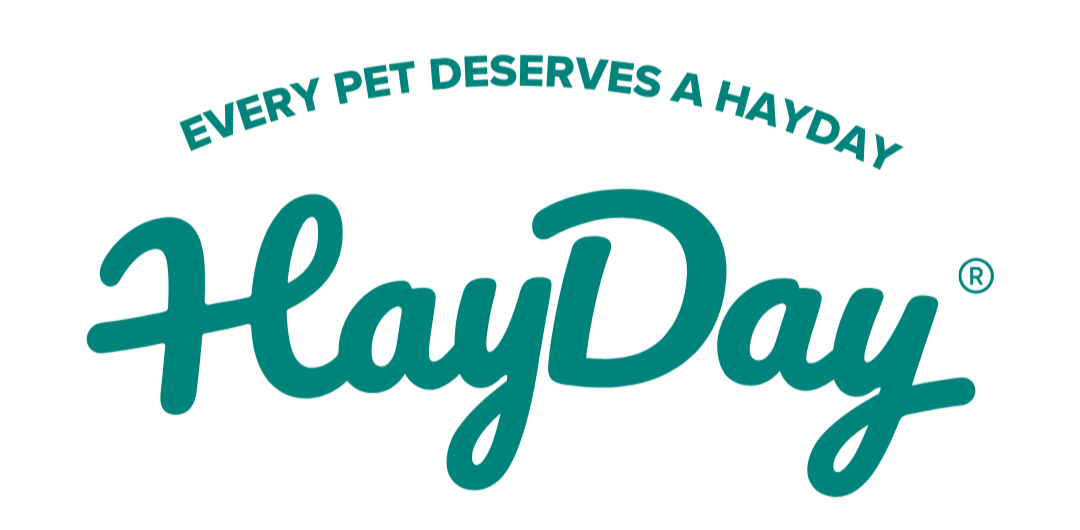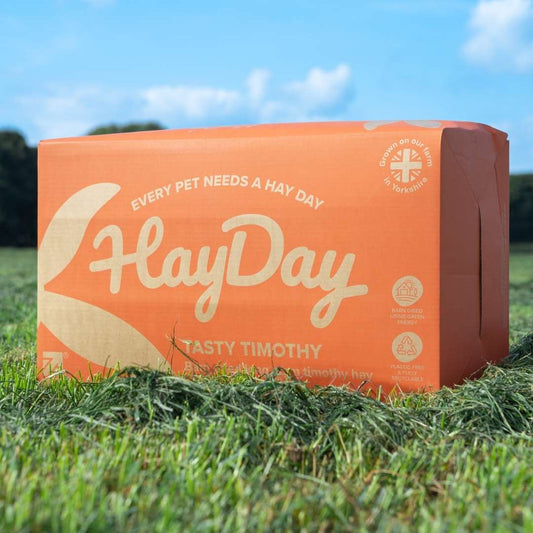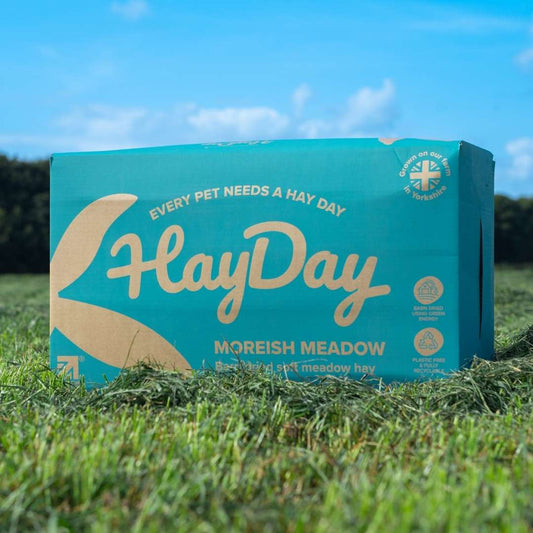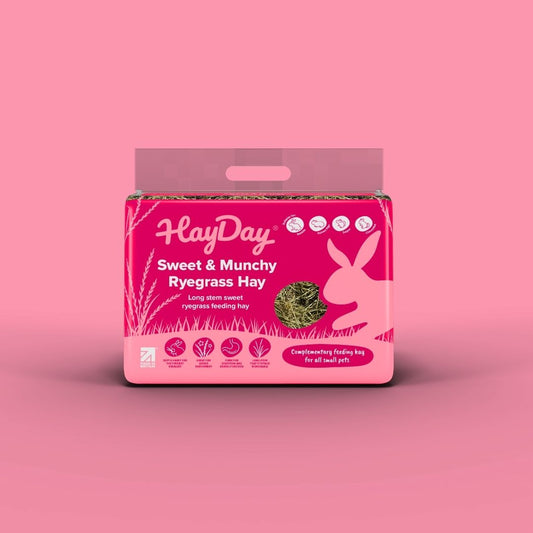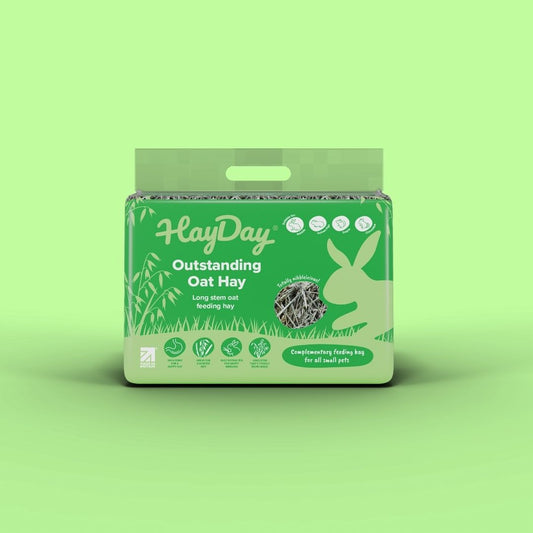Yes, but it’s essential to choose the right types and prepare them properly and not give too much for your rabbit’s safety.
While our interest in rabbit nutrition stems from HayDay's love of providing premium barn dried rabbit hay, we know variety is the spice of life.
We’ll explore which peppers are bunny-approved and how to incorporate these colourful veggies into your pet’s diet without worry. Read on to get all the yummy details!
Shop now > Hay for Rabbits
Feeding Rabbits Peppers - Overview
-
Bell peppers are a healthy and nutritious snack for rabbits to consume, providing essential vitamins, minerals, and hydration, and are available in a variety of colours that ensure a mix of nutrients and flavours.
-
Preparation of peppers for rabbits must involve removing all seeds and cores to avoid digestive issues or choking hazards.
-
While bell peppers are safe and beneficial for rabbits, spicy jalapeno peppers should be avoided due to the risk of gastric upset. Only fresh and raw peppers should be included in a rabbit’s diet, and incorporating a variety of other vegetables is essential for a balanced diet.
Can Rabbits Eat Bell Peppers?
Yes, rabbits can eat bell peppers. Also known as capsicum, are a safe and nutritious snack for rabbits, providing essential vitamins, minerals, and hydration when fed raw.
These vibrant veggies are packed with a range of essential vitamins and minerals that are important for your bunny’s health, including a notable amount of vitamin C.
Can Rabbits Eat Red Peppers?
Yes rabbits, can eat red peppers as when it comes to colour, all bell peppers are safe for rabbits to consume, including the green and red variants.
These peppers don’t just offer safety in consumption for rabbits in small amounts, but they also provide them with additional nutrients that can positively impact their health. Bell peppers offer a fun and colourful way to introduce different textures and flavours into your bunny’s diet.
Green peppers tend to have a slightly bitter flavour, while red peppers are sweeter, providing your bunny with a delightful mix of tastes they’ll surely enjoy - see which ones your bunny prefers and let us know!
Can Rabbits Eat Yellow Peppers?
Yes, rabbits can eat yellow and orange sweet peppers when you’re looking for a safe and tasty treat for your bunny.
These peppers are confirmed as safe for rabbits and can add a bit of sweet crunch to their regular diet. Some other safe vegetables for rabbits include:
-
Broccoli
-
Carrots
-
Celery
-
Cucumber
-
Kale
Remember to introduce new foods gradually (our nutritionists recommended time period is 7 to 14 days!) and in small amounts to avoid digestive upset.
These sweet peppers can provide dietary variety for rabbits without introducing too much added sugars or excessive calories to their diet.
By including these colourful peppers in their meals, you’re ensuring your bunny gets a wide spectrum of nutrients, keeping them healthy and happy.
Removing Seeds & Preparing Peppers for Your Rabbit
While peppers are safe for rabbits, it’s important to prepare them correctly. Removing seeds from peppers is essential as they can cause digestive blockages or choking hazards for rabbits.
The cores of the peppers should also be removed as they can be tough for rabbits to eat and pose a choking risk.
Your bunny’s safety is always paramount, and this includes ensuring their food is prepared correctly.
The Do's and Don'ts of Feeding Peppers to Rabbits
Rabbits can safely consume bell peppers as a part of their diet, but they should not be fed jalapeno peppers due to the risk of gastric upset and discomfort.
Before feeding peppers to rabbits, it is important to remove the core to prevent potential digestive disturbances.
Feeding practices for rabbits include:
-
Offering bell peppers only as an occasional treat in small amounts to avoid digestive upset
-
Ensuring the peppers are fresh and raw
-
Introducing any new vegetables into their diet gradually over 7 to 14 days to avoid digestive problems.
After all, a happy bunny is a well-fed bunny with delicious buns, and they deserve nothing less than fine treats!
Unsafe: Jalapeno Peppers
While bell peppers are a safe treat for your bunny, jalapeno peppers should not be included in a rabbit’s diet because just as they do in humans who struggle to tolerate spicy peppers, they can cause gastric discomfort and other digestive issues.
Fresh and Raw: The Best Way to Serve Peppers
Feeding rabbits raw peppers is crucial to maintain their high nutritional value and prevent potential health issues.
Cooked peppers should not be given to rabbits due to the depletion of nutrients during the cooking process, as well as the risk of causing mouth burns.
Only fresh peppers should be provided to rabbits to prevent health problems associated with rotten or spoiled vegetables.
Additionally, ensure that fresh peppers are thoroughly washed to remove any residue of pesticides or harmful chemicals before offering them to rabbits.
Alternatives to Peppers for a Balanced Rabbit Diet
As we’ve learned, bell peppers are an excellent addition to your bunny’s diet. However, a balanced diet for rabbits includes a variety of fresh vegetables. Safe vegetables for rabbits as alternatives to peppers include:
These vegetables should be provided in moderation as part of a rabbit’s balanced diet. Treats like fresh herbs, veggies and fruits should only be given in small amounts, and owners should ensure rabbits do not consume harmful plants or foods.
Feeding Your Rabbit: What Should a Rabbit Diet look like?
Rabbits require a strict diet to ensure that their sensitive bodies keep on moving, and prevents discomfort with their teeth and tummies.
A rabbits diet should consist of:
-
80 to 90% of premium quality, barn dried hay
-
5 to 10% of rabbit safe pellets
-
5 to 10% of fresh greens, herbs and veggies
Approved Hay for Rabbits: Different Varieties of Hay
There are a range of different hay varieties that are suitable for rabbits, and as experts of what we do at HayDay - we can guarantee top quality hay all year round, due to investment in sustainable farming practices.
Timothy Hay
Timothy Hay is a firm favourite within the rabbit community due to its coarse and crunchy stems. It's high fibre and high protein to support dental, digestive and gut health.
Meadow Hay
Meadow Hay is softer in texture making it a palatable option for your rabbits. It's is high in fibre to support gut health and it also pairs as a comfy bedding hay too.
Ryegrass Hay
Ryegrass Hay is a great feeding hay due to its long, green and stalky stems. With enhanced nutrition and its sweet taste, it's a great forage option to be fed alongside Timothy and Meadow, or fed as the sole forage choice.
Alfalfa Hay
Suitable for young (up to 6 months), growing and nursing small pets, Alfalfa Hay is high in calcium and protein to support health and development. It's also suitable, in small quantities, to be fed to adult small pets for extra enrichment and to top up nutrition where required.
Summary
Feeding your bunny is more than just a daily task; it’s an important part of their overall health and happiness.
Bell peppers, along with a variety of other fresh vegetables, can play a key role in providing the nutrients your rabbit needs.
However, it’s essential to remember that proper preparation and moderation are key to ensuring your bunny enjoys their meals safely. After all, a well-fed bunny is a happy bunny!
Frequently Asked Questions
Can rabbits eat bell peppers?
Yes, rabbits can eat bell peppers as they provide hydration, fibre, and essential vitamins and minerals for their health. Enjoy feeding your rabbit this nutritious treat! Prepare bell peppers for your rabbit by serving them raw, fresh, and without seeds, cores, or leaves.
Are there any peppers that rabbits should not eat?
Rabbits should not eat jalapeno peppers as they can cause gastric upset and discomfort.
What are some alternatives to bell peppers for my rabbit?
You can feed your rabbit celery, spinach, zucchini, broccoli, kale, and asparagus as alternatives to bell peppers. These vegetables are safe for rabbits.
